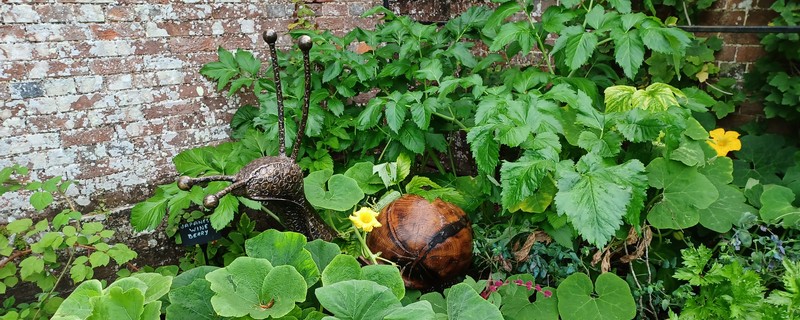Pests and diseases in the garden
Pests and diseases in the garden are an evergreen topic of conversation for gardeners and seeing holes munched in leaves or whole plants struggling is equally frustrating whether you grow fruit and vegetables or ornamental plants. I mentioned last month that gardening is part of the mainstream move towards a more sustainable and nature friendly lifestyle, and we are all becoming more aware of the importance and the declining numbers of many native species in the UK.  But not all the snails are as friendly as the one nestled in the vegetable gardens at Pashley Manor in East Sussex, pictured above. And these two ideas potentially collide when it comes to what to do about pests as so many of them are insects (and other invertebrates) and we know that 41% of insect species are endangered.
But not all the snails are as friendly as the one nestled in the vegetable gardens at Pashley Manor in East Sussex, pictured above. And these two ideas potentially collide when it comes to what to do about pests as so many of them are insects (and other invertebrates) and we know that 41% of insect species are endangered.
Happily there is an approach to pests and diseases that helps us to strike a balance and allows each gardener to make their own, informed decision. The official term Integrated Pest Management first emerged in agriculture, and this is how it works.
Firstly, Cultivation: for some plants you can choose varieties with natural resistance or that crop early before pest and diseases are prevalent, for example early potatoes. Protect plants from specific pests physically with netting or barriers and grow seedlings into strong plants before planting out. Trap and remove pests with beer traps for slugs and pheromone traps for Coddling moth in fruit trees.
Secondly, Biological: the easiest biological controls are the natural predators that we all have in our gardens; birds, ladybirds, hoverflies and frogs all eat insect pests including slugs, caterpillars and aphids. Of course this means laying off the pesticides as much as possible to allow the natural foodchain to get into balance. There are also some biological controls that gardeners can buy in, the most widely used are nematodes (microscopic worms) that predate exclusively slugs or vine weevils.
Finally, you may choose to use pesticides selectively on those plants that still suffer more damage than you can accept. But remember that all pesticides, even the Organic ones, kill a wide range of insects not just the pests that you are targeting.
The Kent Wildlife Trust Wild about Gardens programme provides advice on wildlife friendly gardening.
Happy Gardening from Alison
If you enjoyed reading this blog why not receive my monthly newsletter direct to your email inbox with blogs, video tips and seasonal articles to inspire and inform. Sign up HERE.

